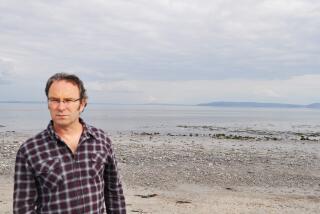A love triangle’s fatal attractions
- Share via
In her latest novel, Ursula Hegi doesn’t waste time building a complex plot up to a suspenseful climax. Instead, she lays out the turmoil in the very first sentence, with the occurrence of a suicide. Thus the suspense lies in the ambiguity of her title, “The Worst Thing I’ve Done.” It’s a phrase that could be uttered by any of her three central characters -- Mason, Annie and Jake -- who are caught in an unhappy and often confusing love triangle. Each harms the others both in deliberate and unintentional ways, creating irreparable damage.
With the setup offered at the start, the remainder of the novel explores the destructive events that led to Mason’s suicide and chronicles its messy aftermath.
Though Mason, Annie and Jake have been friends since childhood, it’s clear that their dynamic has been fraught for years: Mason is attracted to Annie -- yet he is also attracted to Jake, who is drawn to Annie, who is attracted to them both. It’s all rather complicated, as hostility, rivalry, envy and passive-aggressive resentment float from one friend to another. But the manipulative and emotionally needy Mason is the primary source of conflict. He is plagued by “wretched jealousy that stalked me, tackled and leveled me, again and again.”
Annie doesn’t help matters when it comes to setting boundaries. “So close we were, so wondrously close -- a girl-boy being, the best of both in one,” she says. “And it was like that with Jake, too. From childhood on, I believed I was linked to both: one to marry, the other my friend. Not sure which. Yet. But I didn’t mind not knowing because I loved them both, loved how they gravitated toward me while I kept their friendship in balance.”
At 19, Annie decides to marry Mason. On the day of the wedding, her father and (pregnant) mother die in a car accident. When the baby, named Opal, survives, the three friends decide to raise her together, in it-takes-a-village fashion (a plot device more than a little contrived).
Marriage and unconventional parenthood only serve to exacerbate the power struggle between Jake and Mason and inflame Mason’s brooding paranoia. A bizarre example: One day, Annie finds a penny on Mason’s side of the bed while he is out of town. When she asks him about it, she learns that “if the penny had been moved or the sheets changed, it meant I had another man there.”
The only character removed from this toxicity is Annie’s Aunt Stormy, who isn’t really Annie’s aunt but may as well be. She and Annie’s mother were “sisters-by-choice,” both from the same part of Germany, who met as au pairs on Long Island and became close. Aunt Stormy, despite her name and her feisty personality, provides a sense of calm and stability and becomes another parental figure for Opal.
Readers may well find Aunt Stormy the most likable character in the novel. Mason has a touch of charm but mostly comes off as pathetic -- repellently so, especially after he goads Annie and Jake into acting on their mutual desire. Clearly all three are into self-sabotage, not a trait that inspires much sympathy. Mason’s final act -- he hangs himself in the studio where Annie, an artist, makes her collages -- ensures that the place will never again provide a creative refuge for her. He times his suicide to make it likely that Jake will be the one to find him, which is equally insidious.
Mason leaves behind broken lives, but Hegi doesn’t supply him with the introspection that might have transcended the melodrama. Annie and Jake, for their part, don’t evolve so much as muddle forward. The stilted dialogue throughout the narrative only adds to the tedium. These characters are unpleasant, yet not very interesting -- which isn’t a great combination.
You needn’t go back a decade, to the Oprah selection of her novel “Stones From the River,” to know that the author can do better than this. Even 2004’s “Sacred Time” showed how gifted Hegi is at using a tragic event to expose and define a family’s dynamic. In that novel, honesty and nuance were in abundance, yet the only quality that “The Worst Thing I’ve Done” shares with it is a lack of sentimentality. Hegi hints at potential future happiness for Annie and Jake but doesn’t venture further. Subtlety is a virtue, to be sure, but here it isn’t enough to render her new novel a satisfying read.
--
Carmela Ciuraru is the editor of six anthologies of poetry, including “Beat Poets.”
More to Read
Sign up for our Book Club newsletter
Get the latest news, events and more from the Los Angeles Times Book Club, and help us get L.A. reading and talking.
You may occasionally receive promotional content from the Los Angeles Times.







